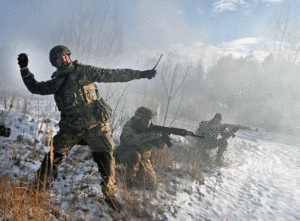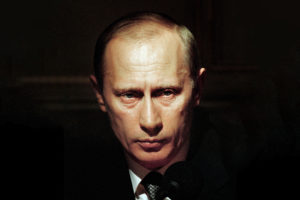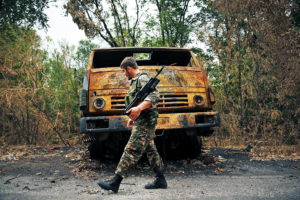Cast your mind back to February 2014 — and the dramatic conclusion to the Euromaidan protests in Kyiv. Given the choice between alignment with Brussels or Moscow, there was no doubt as to where the crowd’s sympathies lay.
On the night of the 20th, a special guest from the European Parliament got up on stage: Guy Verhofstadt, the arch-federalist and former Prime Minister of Belgium. Addressing the cheering throng he was full of praise: “you are defending European values and European principles.”
Two days later, the pro-Moscow Yanukovych government was forced from office. The protesters had won — and so, it seemed, had the European Union. Who needs an army and a navy when you’ve got “values” and “principles”?
Fast forward to the present day and the Russian military is massed on Ukraine’s borders, poised to complete a conquest that began with the annexation of Crimea. I suppose Mr Verhofstadt could be deployed to stand in Moscow’s way, but on this occasion I doubt it would do much good.
However, Brussels could focus on something else he said back in 2014: “we as the European Union have one obligation… that’s to stay behind your cause.” In that regard, the EU might not have any military power of its own — but it does have diplomatic power.
Indeed, the EU has a fully-fledged foreign policy apparatus. It has a High Representative (currently Josep Borrell) to act as the EU’s foreign minister; it has embassies and consulates around the world; and it has direct representation on powerful bodies like the G7 and G20. Its diplomacy is also backed with the clout that comes from being the world’s biggest trade block.
So given that capacity, one might expect the EU to be leading the effort to save Ukraine. But instead its diplomats are on the sidelines — much to the frustration of Emmanuel Macron, among others. Instead, the future of Ukraine — and by extension Europe — is being hammered out between Washington and Moscow. Even Britain, supposedly isolated by Brexit, has made a bigger impact than Brussels.
The Russians, meanwhile, are laughing. Commenting on the EU’s lack of involvement, Sergei Lavrov — the country’s Foreign Minister — expressed mock sympathy: “We can see that the European Union feels somewhat disadvantaged.” As to the possibility of a separate EU-Russia dialogue Lavrov observed that “the US needs to be asked if it is willing to let [the EU] take any independent action.”
He was making mischief, of course. It’s not the US stopping the EU from taking a leading role — but the EU itself. The Ukraine crisis is the greatest test that the Common Foreign and Security Policy has ever faced, and so far the failure is comprehensive. Beyond the usual empty words and token gestures, the 27 member states of the European Union have been unable to present a united front.
There’s no doubt as to which of the 27 is most to blame. As I have argued before, Germany was warned years ago that its collaboration with Russia on energy supplies would undermine the security of Russia’s neighbours. Now that these fears have been realised, the new German government has a chance to make amends. But far from showing leadership, the German Chancellor, Olaf Scholz, has weakened Europe’s resolve — for instance by blocking defence exports to Ukraine.
The EU is Russia’s biggest trading partner — accounting for more than a third of its imports and exports. Comprehensive economic sanctions could therefore act as a serious deterrent to war. However, the threat has to be credible. There was fighting talk this week from the Danish foreign minister, who said the EU is ready to impose “never seen before” sanctions. However, that doesn’t match Scholz’s less-than-resolute language: “no one should harbour the illusion that there is any step that has no consequences for us.”
It also didn’t help when Vice Admiral Kay-Achim Schönbach, the German naval chief, had to resign after some unguarded comments about the current crisis. “What [Putin] really wants is respect,” he was reported as saying, “and, my God, giving someone respect is low cost, even no cost… It is easy to give him the respect he really demands — and probably also deserves.” No doubt Putin was left wiping away the tears.
So is the EU’s problem actually a German problem? Up to a point, but the blame must be shared by other member states for tolerating it. If they won’t stand up to German flakiness on foreign and defence policy, then what chance do they have against Russian aggression?
Unfortunately, EU governments are under very little pressure from their voters to take the continent’s defence seriously. Consider the core principle of NATO — the Article 5 obligation that every member of the organisation should come to the military aid of any member that is attacked. In other words, one for all and all for one. According to this 2020 Pew report, there was majority support for this principle in some EU countries, but not others. Asked whether their own country should respond militarily to a Russian attack on a fellow NATO member, 64% of those asked said yes in the Netherlands, but only 41% in France and Spain, 34% in Germany and just 25% in Italy. This compares to 60% in the US and 55% in Britain.
Somewhat hypocritically, much higher percentages expect that the United States would respond to a Russian attack: 75% of Italians thought so as did 63% of Germans. Clearly, many Europeans assume that they will be defended — even if they aren’t prepared to contribute to the defence of their neighbours.
Ukraine, of course, is not a NATO member. And perhaps that’s why the EU isn’t doing all it can to deter Russia. The assumption is that Kyiv represents an endpoint for Moscow’s ambitions — not a pit stop on the way to Vilnius or Warsaw or Berlin. Let’s hope that theory is never tested.
What makes the EU’s irresponsibility harder to take is the very nature of the “European project”. On the 1st January, 1999 the euro came into being — and changed the character of the European Union forever. From that moment, it became a fundamentally inward-looking enterprise devoted to the survival of the single currency at any cost. The alternative path that the EU could have taken: a looser association of nations — but one that doesn’t stop halfway across the continent — was forever closed off.
Well, so be it. Every empire has to have a frontier. But when the line is drawn, one has to be ready to guard it. One cannot exclude unless one is prepared to defend. The EU seems oblivious to this — and that is its greatest failure.
Disclaimer
Some of the posts we share are controversial and we do not necessarily agree with them in the whole extend. Sometimes we agree with the content or part of it but we do not agree with the narration or language. Nevertheless we find them somehow interesting, valuable and/or informative or we share them, because we strongly believe in freedom of speech, free press and journalism. We strongly encourage you to have a critical approach to all the content, do your own research and analysis to build your own opinion.
We would be glad to have your feedback.
Source: UnHerd Read the original article here: https://unherd.com




